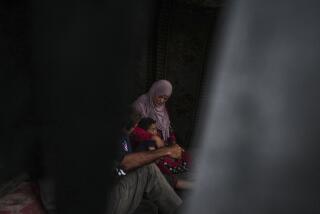U.S. Troops Put Down Guns, Pick Up Forks
- Share via
TIKRIT, Iraq — The pace of the guerrilla war in Iraq slowed enough for more than 100,000 American troops to pause briefly with tens of thousands of civilian workers for Thanksgiving dinner Thursday before returning to their dangerous jobs.
On a day largely free of insurgent attacks, about 3,500 soldiers with the 4th Infantry Division’s 1st Brigade in Tikrit created a festive atmosphere, tinged with homesickness, for a few, fleeting hours.
Their commander, Col. James Hickey, allowed most soldiers, who usually rise at 6 a.m. to face a guerrilla campaign in the heart of the so-called Sunni Triangle, to sleep until 8 a.m. After a week and a half of spartan living as desert scouts, Hickey called a cavalry unit back for a turkey dinner and a night’s sleep in the comparative splendor of the former Iraqi army base overlooking the Tigris River in Saddam Hussein’s hometown.
But he expected something in return.
“We give them a good night on Thursday and let them hit the recon trail again Friday morning,” Hickey said. “I’ll get 300% more effectiveness out of them Friday, Saturday and Sunday.”
Feeding the 24,000 soldiers of the 4th Infantry Division and 11,000 civilian contractors and support staff in Iraq is a massive undertaking.
The 4th Infantry Division dined on 170 turkeys weighing an average of 25 pounds each. Next to the turkey they piled ham, Cornish hen, roast beef, shrimp, mashed potatoes, sweet potatoes and cornbread stuffing, washing it all down with eggnog, soda and nonalcoholic wine. For those who found that too limiting to repeat for dinner, the chefs added lobster tail and crab legs to the menu. An array of desserts included pies, pastries and cakes.
It might seem like an enormous amount of energy diverted from a war in which U.S. troops are struggling to fend off an enemy that is maiming and killing them singly and in small groups. But making a production of Thanksgiving is vital to troop morale, said Richard McCord, who as a first sergeant acts as a stand-in father for young soldiers.
McCord figured he’d spent half his 19 Thanksgivings away from home since joining the Army. All those years in uniform haven’t made it any easier to be away from his wife and three children, he said. “But you’ve got family here too,” he added.
President Bush chose the holiday to make a surprise 2 1/2-hour visit to soldiers some 100 miles to the south, at the Baghdad airport.
“Today, Americans are gathering with their loved ones to give thanks for the many blessings in our lives,” Bush told troops and dignitaries there. “And this year we are especially thankful for the courage and the sacrifice of those who defend us, the men and women of the United States military.”
In Tikrit, Capt. Michael Nienhaus spoke of those challenges. “There’s always 100 things to do,” said Nienhaus, who like most of the officers in the 4th Infantry Division’s 1st Brigade, turned the tables and served the lower-ranking troops. “When a place is this dangerous, it never stops.”
Minutes after he spoke in an ornate cafeteria at a small base for a few hundred troops on the low cliffs lining the west bank of the Tigris, about 25 soldiers in four camouflage motorboats pulled alongside two red-turbaned fishermen who had strayed too close in a metal rowboat. After a few minutes of questioning, the men rowed away with a wave.
Missing the traditional sport of the day, soldiers tossed a football on an unusually gray, rainy day in a garden ringed with palm trees. They watched a golf roundup, the only sports show available in the wee hours on American television, and wished they were watching football.
They spoke of a yearlong deployment not due to end until April, and of the chances of their country withdrawing completely next year.
“People talk about us clearing out of Iraq by next spring,” Spc. John Almen said before heading out on a patrol on which U.S. soldiers have routinely faced automatic rifle fire, rocket-propelled grenades and roadside bombs. “I don’t believe it.”
Even cooks carry weapons in open-doored Humvees along Tikrit’s violent roadways. Asked what bothered him most about his duties, Spc. John Smith of Washington, D.C., said, “That’s the only thing, being out there on the roads and knowing what’s out there.”
At the 1st Brigade’s base, four miles from the division’s main headquarters, Smith and other Army cooks spent two days preparing food for their colleagues.
Cpl. James Shamel of Trenton, N.J., stayed up until midnight Wednesday slicing meat. Smith rose at 3:30 a.m. to grill ham and cook eggs.
Spc. Elizabeth Soria of Bakersfield would like to have spent the first Thanksgiving since her mother died in the company of an extended family that usually numbers nearly 40. To the soldiers gearing up to take her unit’s place in April, she advised: “Don’t take things for granted. Be ready for the weather.”
Pvt. 1st Class Stefanie Ellen of Nashville was a month and a half out of basic training when she was told she’d be joining the 4th Infantry in Turkey. That was before Turkey denied the U.S. its bases for American ground troops. So she found herself serving turkey in Tikrit instead.
“It makes working all day yesterday and all night worthwhile to see their smiles,” she said as soldiers stopped by to give her thanks for the meal and a pat on the back. “I feel we give them a piece of home here.”
More to Read
Sign up for Essential California
The most important California stories and recommendations in your inbox every morning.
You may occasionally receive promotional content from the Los Angeles Times.










